 MyCatBreeds
MyCatBreeds Egyptian Mau is originated from Egypt but African Serval is originated from South Africa. Egyptian Mau may weigh 12 kg / 26 pounds lesser than African Serval. Egyptian Mau may live 5 years less than African Serval. Both Egyptian Mau and African Serval has same litter size. Both Egyptian Mau and African Serval requires Low maintenance.
Egyptian Mau is originated from Egypt but African Serval is originated from South Africa. Egyptian Mau may weigh 12 kg / 26 pounds lesser than African Serval. Egyptian Mau may live 5 years less than African Serval. Both Egyptian Mau and African Serval has same litter size. Both Egyptian Mau and African Serval requires Low maintenance.
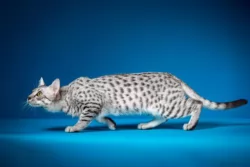 The Egyptians have always been interested in cats, and it is believed that in 1953 a noblewoman left Egypt with a tabby cat, returning to Italy.
The Egyptians have always been interested in cats, and it is believed that in 1953 a noblewoman left Egypt with a tabby cat, returning to Italy.
Later, another cat was also brought to Italy and the pair were mated. The Egyptian Mau is a natural breed.
In 1956, a kitten of the pair was brought to the United States and the Egyptian Mau was developed. A breeding program was started in the United States. The breed Egyptian Mau was recognized in 1958 in the United States and 1992 in Europe.
 The African Serval is a wild cat that hails from Africa. You’ll see them on Africa’s savannas where there is tall grass and reeds, preferably near water.
The African Serval is a wild cat that hails from Africa. You’ll see them on Africa’s savannas where there is tall grass and reeds, preferably near water.
If you want to own a serval cat, you have to check whether you require licenses and permits as they are particularly difficult to rehome once you have owned one. Humans have kept them since ancient times, but they are not domesticated cats as such.
Breeding servals arrived in the United States many decades ago. Breeders have also crossed serval cats with domestic cats to produce hybrids, one of which is the Savannah cat.
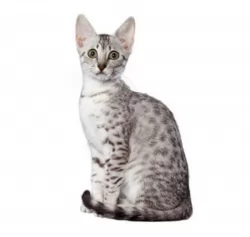 This is a medium-sized, long, athletic cat that is well muscled. It weighs between 3 to 5kg. The Mau is heavily muscled and strong. It has a triangular-shaped head with large almond-shaped eyes.
This is a medium-sized, long, athletic cat that is well muscled. It weighs between 3 to 5kg. The Mau is heavily muscled and strong. It has a triangular-shaped head with large almond-shaped eyes.
The coat of the Mau is medium in length and is glossy and soft. There are spots on the coat but the cat is particularly well known for the dark stripe that runs from its head to its tail. The coat comes in several different colors such as silver, black, tan and blue. All Maus have green eyes.
These cats are known for being loyal and friendly and they love warm weather and enjoying a spot in the sun.
They are talkative cats too and also love to sit on high perches and survey the world from these high positions. They are excellent climbers and you’ll need to supply these cats with a climbing tree. Its an intelligent breed and he will get along well with children in the home as well as be friendly towards other pets.
 The Serval is a medium to large-sized cat that stands at between 54–62 cm in height and weighs in the region of 9–18 kg.
The Serval is a medium to large-sized cat that stands at between 54–62 cm in height and weighs in the region of 9–18 kg.
Some people think its a cat that looks similar to a Cheetah and this is because it also has a small head. It is known for its large ears which are black at the back with a large white dot. The attractively patterned coat is both spotted and striped with black against a golden/tawny shade.
These wild cats make a number of different noises - high pitched cries to growls, spitting sounds and purring. Another well-known feature with the cat is its particularly long legs. The tail has some black rings and it is black-tipped. The eyes of the Serval are a brown/greeny color.
The Serval cats will only come together for mating and then they resume their solitary lives. Gestation lasts for roughly 73 days after which up to 6 kittens can be born. In captivity, a Serval can live to be about 20 years of age.
The Serval is an active cat night and day. They are solitary animals not known for strong social interactions with humans but they can be playful with the few humans he gets to know.
People need to always know that owning a wild pet like this comes with risks. Not only that, a Serval wants to mark its territory and while you may provide a litter box, it's not to say he will use it.
They are able to bond with humans to some extent, more so if they were hand-fed from early on. They bond with one person and can form an affectionate relationship with that one person.
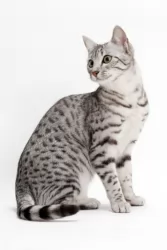 These are social cats with their own human family but the Egyptian Mau does tend to be a bit reserved around strangers.
These are social cats with their own human family but the Egyptian Mau does tend to be a bit reserved around strangers.
They make excellent pets and companions and if he is happy, you’ll hear him making little noises to express his contentment.
What also makes him so attractive as a pet is that he is a short-coated cat that is considered to be low maintenance.
Before you decide to take on any animal as a pet and before you bring the Egyptian Mau into your home, do thorough research on this rare cat breed. If you do decide to take him in, find out all you can on how to provide for him so that he receives the best care and love in your home.
 The African Serval is a wild animal and should be left in the wild.
The African Serval is a wild animal and should be left in the wild.
However, if you do decide to bring one into your home as a pet, they aren’t recommended for homes with young children or for a first-time pet owner.
Their play is rough and they like to use their teeth and claws during play. If the child gets hurt, then in typical unfair human fashion, the Serval is the one who suffers. They are capable of making good pets though but it is not recommended.
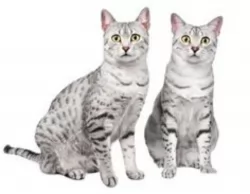 Egyptian Maus are strong, robust cats and they don't have any particular health problems.
Egyptian Maus are strong, robust cats and they don't have any particular health problems.
Obesity is a major disease with this cat and all other cats and it's worth noting, as obesity contributes to a great number of illnesses in cats. Excess weight can lead to diabetes and arthritis and well as other life-threatening diseases.
Two things that play an important role in his health are ensuring that he has access to excellent, nutritious, meaty food, as cats are carnivores.
You also want to ensure that he gets all his vaccines and de-wormings. If you notice that your cat seems to be under the weather, get him to the vet as soon as possible.
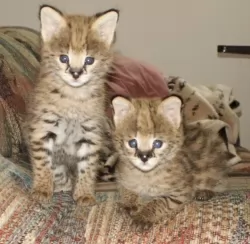 Make sure that before you take in a Serval as a pet you have access to a good veterinarian who is experienced in helping exotic pets.
Make sure that before you take in a Serval as a pet you have access to a good veterinarian who is experienced in helping exotic pets.
Also, the African Serval, when domesticated, will need the same cat vaccines that you would give your regular kitten.
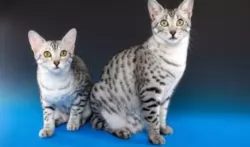 The beautiful coat of the Egyptian Mau is easy to care for and a weekly brushing will ensure it stays shiny and healthy.
The beautiful coat of the Egyptian Mau is easy to care for and a weekly brushing will ensure it stays shiny and healthy.
If he will let you, try to look inside his mouth to ensure the teeth and gums are healthy.
Remember, if there are any grooming activities for this cat that you feel you can’t cope with, professional groomers will do it for you.
Provide your Egyptian Mau with a climbing tree and scratching post as the cat loves to jump and climb.
He is an active, intelligent cat and needs to be stimulated with exciting toys, particularly when you’re not around to entertain him.
Cats such as the Egyptian Mau are clean and they want their litterbox to be kept clean. Invest in scoop and rake and rid the litter box every day of cat droppings. There also comes a time when you will have to replace all the sand or grit as well.
It will be fantastic if you can provide this cat with a water fountain and a type of pool as they love playing in water.
Make sure your Mau has constant access to fresh, cool drinking water.
 The Serval is a wild cat so in the wilds it eats prey such as frogs, birds and reptiles. They are known for leaping high into the air to catch prey but they will also burrow into holes to get prey out.
The Serval is a wild cat so in the wilds it eats prey such as frogs, birds and reptiles. They are known for leaping high into the air to catch prey but they will also burrow into holes to get prey out.
You should try to provide your Serval pet with some whole prey. Do research on the food of Servals because you will need to offer your wild pet a feline supplement. There are also formulated pelleted food, but this shouldn’t form the bulk of his food but rather be a supplement to his meats. Choose a variety of meats such as chicken, mice, turkey, beef, duck as well as rabbits and birds.
If you keep a serval, it is imperative that it has large outdoor areas to roam in. They’re nocturnal animals, so they become more active at night. They’re used to living near streams in the wild so some kind of pool will be required for him, possibly even a fish pond where he can catch his own fish.